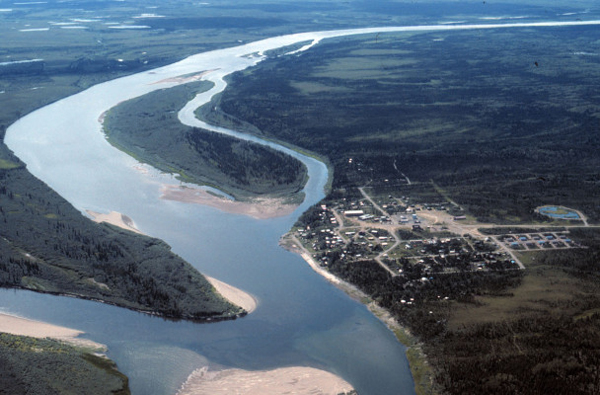The lure of John McPhee’s “Coming into the Country,” 40 years later
“Coming into the Country,” John McPhee’s book about Alaska, was published in 1977, introducing readers across the country to a wild place, less than 20 years into its statehood. The book quickly became a best-seller and is still popular with tourists and Alaska residents alike. Listen now
Citizens group investigates Cook Inlet’s aging oil infrastructure
A watchdog citizens group is working on a series of reports on Cook Inlet’s oil and gas infrastructure, following several accidents last spring. Listen now
At Fairbanks Arctic Council meeting, the big question mark is climate change
As representatives from eight Arctic nations gather in Fairbanks, one issue is looming over the meeting: climate change. Listen now
Latest oil tax credit bill off to a rough start in state House
Last session, the fight over oil tax credits was one of the biggest questions lawmakers sought to answer. And while they did manage to pass a bill, it focused on Cook Inlet. Now, many lawmakers are saying it’s time to look at the North Slope. Listen now
BP likely to plug thirteen at-risk wells after April accident
BP thinks the accident was caused by thawing permafrost deep below the surface, which put uneven stress on the well. Eventually, the well gave out, rising several feet out of the ground and colliding with the top of the building over the well. Listen now
Study: Tundra fires induce permafrost melt, land change
Wildfire on Arctic tundra can cause permafrost melt from the top down, contributing to landscape slumping, known as thermokarst.
Download Audio
Ketchikan planes in mid-air crash both had equipment designed to help avert collisions. What went wrong?
How the planes' GPS transponders were or weren't working is a question investigators will explore, they said Wednesday.
Rating agencies warn Alaska: we’re watching you
In his quest to remake Alaska's finances, Governor Bill Walker has found a set of perhaps unexpected allies. Download Audio
Oil and subsistence in the warming Arctic: A conversation with Tom Kizzia
In the most recent issue of The New Yorker, Alaska writer and longtime former ADN reporter Tom Kizzia looks back at the debate over offshore drilling in North Slope communities. Kizzia visited Point Hope to report on how climate change is affecting the region’s twin pillars: oil development and subsistence hunting.
El Nino is out. Will La Nina follow?
One of the strongest El Ninos on record ended in May. A strong La Nina would normally follow. But that isn’t a sure bet this time around. Listen now
In Newtok, residents worry the encroaching river will destroy a way of life
When the river takes the first houses, the village could start to scatter. And Newtok’s blend of the modern and traditional could erode away with the land. Listen now
New construction at Gustavus airport digs up old concerns about toxic chemicals
Contractors plan to break ground on a multimillion dollar airport project in Gustavus this month. But newly discovered toxic chemicals at the site make the state-run project more complicated, and some residents don’t think the environmental oversight goes far enough to keep them safe.
Climate change hits Alaska’s rural water and sewer systems
For decades, Alaska has struggled to get running water and sewer systems to its rural communities. An estimated 3,000 households — or about 10,000 people — still lack both. Now, that job may be getting harder, as climate change exacerbates old problems and creates new ones. Listen now
Trump admin sets crosshairs on Park Service predator rule
The Trump administration is trying to erase another part of President Obama's environmental legacy in Alaska: It wants to roll back a National Park Service ban on several controversial methods of killing bears and wolves. Listen now
How oyster milkshakes and teamwork are getting Alaska’s shellfish safely to market
There was an uptick in paralytic shellfish poisoning this summer. But scientists think the future of oyster farming in Alaska still looks bright. Listen now
Credit rating agency sees a ‘clear path,’ as Alaska tries to balance its budget
In less than a year and a half, Alaska went from one of Moody's highest rated states, to one of its lowest. But now, that's changed. Listen now
Newtok asks: Can the U.S. deal with slow-motion climate disasters?
The village of Newtok has requested a federal disaster declaration from President Barack Obama to address ongoing erosion and thawing permafrost. It’s one of the first tests of whether the nation’s disaster relief laws can be used to deal with the slow-moving impacts of climate change. Listen now
Donlin Gold looks to schools, workforce development for future employees
Donlin Gold promised to hire local workers for its proposed gold mine. To fulfill that promise, the company knows that it has to start now and it has to start young.
Scientists see the future in the bellies of fish
Southeast Alaska is home to hundreds of glaciers and a lucrative fishing industry. As those glaciers retreat, the freshwater they send into the ocean could begin to dry up. Scientists are trying to figure out how that will impact the marine environment. Listen now
Legislators quiz Alaska LNG project managers on progress
State-led Alaska gasline project leaders confident on progress, minimize tariff impact during legislative update. Listen now























